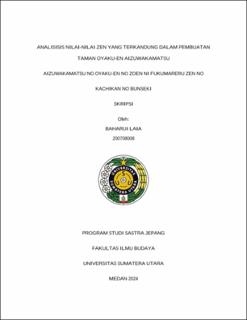| dc.description.abstract | The aim of this research is to explore and explain the history and development of Zen teachings in Japan and describe the values reflected in the construction of Oyaku-en Garden in Aizuwakamatsu, as well as to identify the functions of each material used in the creation of Oyaku-en Garden in Aizuwakamatsu. The research method used in this study is qualitative research with a descriptive-analytical approach. The data collection techniques employed in this research include interviews, documentation, observation, and literature study which draw upon sources from journals, articles, books, previous research, and other resources available on the internet. The results of this research reveal six (6) Zen values reflected in the construction of Oyaku-en Garden, namely: 簡素 Kanso (Simplicity), 不均整 Fukinsei (Asymmetry), 自然 Shizen (Naturalness), 静寂 Seijaku (Tranquility), 脱俗 Datsuzoku (Originality and Freedom), 幽玄 Yuugen (Profound Depth). Additionally, the materials used in Oyaku-en Garden include 水 Mizu or water, 植物 Shokubutsu or plants, 石 Ishi or stones, 柵 Saku or fences, 灯籠 Tourou or lanterns, 橋 Hashi or bridges. Thus, the Zen values embodied in the construction of Oyaku-en Garden are not only reflected in its aesthetic aspects and the materials used, but also in its function as a space for meditation and reflection. | en_US |


